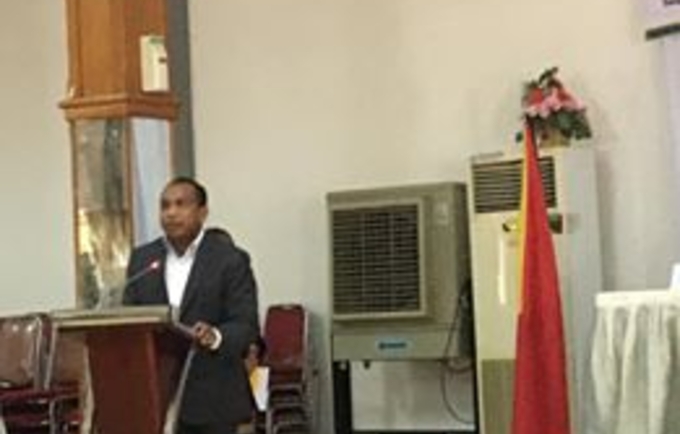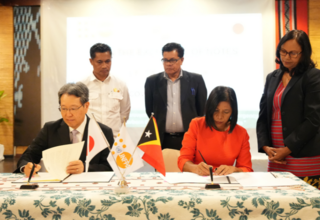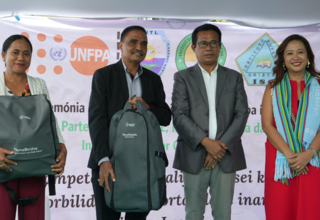National Parliament, Dili, 21-22 September 2016 - A crucial conference was held in Dili last week to underscore the importance of investing in the sexual and reproductive health and well-being of women, girls and young people to ensure a brighter future for all of Timor-Leste, as the country works to fulfill the 2030 Sustainable Development Agenda.
The National Conference on Reproductive Health, Family Planning and Sex Education (September 21-22) was a follow-up to the 2010 national conference and seven regional consultations which laid the foundation for Timor-Leste to address several challenges, including maternal mortality, unmet family planning needs and teen pregnancy.
While progress has been made in expanding health services across the country, significant challenges remain. Far too many women die during childbirth, with maternal mortality at 555/100,000 live births. The fertility rate - the number of births per woman -- stands at an average of 5.7. Seven per cent of adolescent girls fewer than 15-19 years of age get pregnant. HIV and sexually transmitted infections are on the rise, as is gender-based violence.
At last week's conference, the Government, National Parliament and a range of stakeholders including civil society organisations and the United Nations system sought to review the gains of recent years as well as strategise for the years ahead.
The National Parliament (specifically the Grupo da Mulheres Parlamento Timor-Leste/GMPTL and Committee F) plays a key role in driving policy and providing direction for decisive and effective action to tackle the challenges of ensuring reproductive rights for the population of Timor-Leste. Under a 2009 resolution, GMPTL is mandated to oversee the implementation of a gender responsive state budget to help allocate sufficient resources for women's health and fertility management.
By analyzing the status of key recommendations from the 2010 conference, participants at last week's consultation will identify key priorities for the future, aligning current policies and strategies with the Sustainable Development Goals and other international commitments, and building consensus amongst key stakeholders to develop a 2016-2019 Road Map for Action.
"When we have strong approaches, efforts and strategies these will give us ways for maximizing resources so that we move towards a country where everyone can enjoy their health rights, including their sexual and reproductive rights, fully and freely, with dignity and quality," said Honorable MP, Albina Marçal Freitas, Vice-President GMPTL. "But Government and Parliament, including GMPTL, cannot do this alone. We need the unified and strong committment, engagement and participation of all people and institutions including line ministries, international and national organizations, civil society organisations including women's groups, faith-based organizations, youth groups and the media. Let us work collectively as a nation to truly fulfill the pledge of the 2030 Sustainable Development Agenda - to leave no one behind."
During the two-day conferences, there were international speakers coming from Papua New Guine, Asian Forum of Parliamentarians on Population and Development (AFPPD), Former UNFPA's representative in Philipines, Interfaith Organizations from Philipines, Faith Based Organizations, and Civil Societies. Participants for the conferences were some parliament members, faith based organizations, line ministries (Education and Health), youth representatives and media.
GMPTL acknowledges strong support from line ministries (Ministry of Health, Ministry of State for Social Affairs, National HIV/AIDS commision, Rede Feto, John Snow Institution-United States Agency for International Development (JSI-USAID), United Nations Population Fund (UNFPA), World Health Organization (WHO), Alola Foundation, Health Alliance International (HAI) and Marie Stopes Timor-Leste for technical support before, during and after the conferences.
Tetum Version
Konferensia Nasional kona-ba Saude Reproduktiva no Seksual
Tema "Investe ba Saude Feto Nian, Investe ba Futuru Timor-Leste"
Parlamento Nacional, 21-22 Setembro 2016 - Konferensia ida-ne koalia kona-ba importansia investe iha saude reproduktiva no seksual no moris diak feto no labarik feto sira, no jovem sira atu garantia futuru ida nebe diak ba Timor oan hotu ho tempo ne'ebé nasaun atu responde ba Objektivu Dezenvolvimentu Sustentavel 2030.
Konferensia Nasional kona-ba Saude Reproduktiva, Planeamentu Familiar no Edukasaun Saude (Setembru 21-22) hanesan konferensia follow-up husi konferensia 2010, iha neba hala'o tiha ona konferensia hitu iha nivel rejional no konferensia nasional ida ne'ebe sai hanesan baze ba Timor-Leste hodi bele responde ba obstaklus, inklui mortalidada maternal, nesesidade planeamentu familiar ne'ebe la limitadu no isin-rua sedu.
Maske iha progresu barak ne'ebe maka atinji tiha ona iha area saude iha nasaun laran, obstaklus lubuk boot sei iha nafatin. Inan barak maka sei mate durante partus, iha numeru 555/100000 partus. Rasio fertilidade - numeru partus kada feto - sei iha 5.7. Pursentu 7 adolesente feto sira iha tinan 2010 hetan isin-rua sedu. HIV no infeksaun moras hadaet liu husi relasaun seksual kontinua sae nune'e mos violensia bazea ba jeneru..
Konferensia durante semana ida nee, Governu, Parlamentu Nacional no stakeholder sira inklui sosiadade sivil no ajensia ONU buka atu avalia fila fali saida maka atinji tiha ona nunee mos estratejia sira ba futuru.
Parlamentu Nacional (liu-liu Grupo da Mulheres Parlamento Timor-Leste/GMPTL no Komisaun F) iha papel importante atu lori ajenda politika no fornese dirasaun ba aksaun nebe desisivu no efeitivu atu responde ba obstaklus sira atu garantia direitus reproduktiva ba populasaun Timor-Leste. Liu husi resolusaun 2009, GMPTL hetan mandatu atu halo supervizaun ba implementasaun orsamentu estadu sensível ba jéneru, ne'ebé bele fo dalan ba afetasaun ba rekursu sufisientes ba jestaun saúde no ba fertilidade feto sira nian.
Liu husi halo analizasaun ba rekomendasaun xave sira husi konferenia 2010 iha semana ida nee, partisipante sira sei identifika prioridades sira ba futuru, alinha ho politika no estratejia hirak dadaun ho Objektivus Dezenvolvimentu Sustentavel no Komitmentu internasional sira seluk, no hetan konsensu entre stakeholder sira atu dezenvolve Planu Aksaun 2016-2019.
"Bainhira ita iha aproximasaun ida nebe forte, esforsu sira no estratejia, buat hirak nee sei guia ita atu maximiza rekursusu nebe maka iha hodi nunee nasaun nee bele ba oin iha nebe ema idak-idak bele goza sira nia direitus saude, inklui direitus saude reproduktiva no seksual livre, ho dignidade no kualidade " (S.E. membru Parlamentu, Sra. Albina Marçal Freitas, Vice Prezidente GMPTL "Maibe Governu no Parlamentu, inklui GMPTL labele halo ida nee mesak. Ita presiza komitmentu ida ne'ebe unido no forte, involvimentu no partisipasaun husi ema hotu no instituisaun sira inklui linha ministerius sira, organizasaun internasional no nasional, organizasaun sosiadade sivil inklui grupu feto, organizasaun konviksaun relijiosa, grupu juventude no media. Mai ita hotu servisu hamutuk hanesan nasaun ida atu bele atinji Ajenda Dezenvolvimentu Sustentavel 2030 - la husik ema ida iha kotuk."
Durante konferensia loron rua nee, iha oradores internasional mai husi nasaun Papua New Guine, Forum Asian Parlamentu ba Populasaun no Dezenvolvimentu (AFPPD), sesante reprezentante UNFPA iha Filipina, Organizasaun Interfaith husi Filipina, Organizasaun Konviksaun Relijiosa no sosiadade sivil sira. Partisipante iha konferensia nee maka membru parlamentu sira, membru governu, linha ministerius sira (Edukasaun no Saude), representative juventude no media.
GMPTL rekunhese suporta maximu husi linha Ministerius sira (Ministeriu Saude, Ministeriu Estadu ba Asunto Sosial (MECAS), Komisaun Nacional Kombate HIV/SIDA, Rede Feto, John Snow Institution-United States Agency for International Development (JSI-USAID), Fundus Nasoens Unidas ba Populasaun (UNFPA), Organizasaun Saude Mundial (OMS), Programa Mundial Aihan (WFP), Aliansa Internasional Saude (HAI), no Marie Stopes Timor-Leste ba suporta tekniku antes, durante no depois konferensia.



